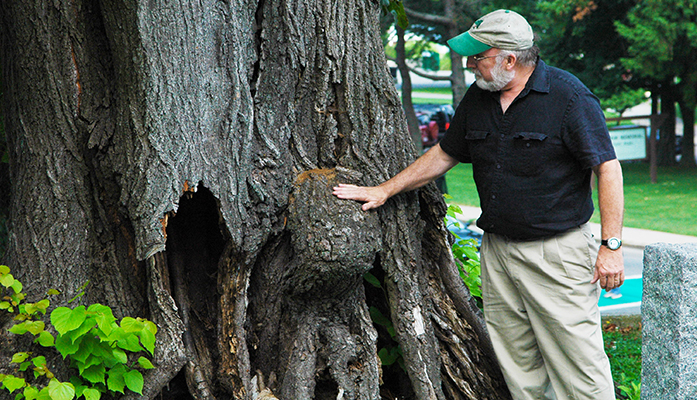
A passionate arborist shows us that protecting our trees means protecting our future
When Bob Wells (Master of Environmental Studies ’13) talks about the White Oak, it’s like listening to an artist talk about his muse, “It’s the most beautiful tree there is on the eastern seaboard.” As the Arboriculture Director at Morris Arboretum, Bob admits, “people get very emotionally involved with their trees.”
It’s no wonder, either. Trees provide us with much more than shade. As Bob explains, “Having trees in urban environments is crucial for good mental health, and we have that at Penn like no other campus, and we can quantify and demonstrate. Having a program like MES gives that strong credibility.”
As a consultant, Bob works with Penn to plan safe methods of construction that won’t disrupt Penn’s 7,000 trees’ growth or health. This type of conservation is crucial not only for keeping our campus green but for maintaining a balanced ecosystem and protecting the future of our environment. “There is a whole field of study now called veteran tree care management. Older trees have incredible value and return far more environmental benefits than a younger tree does,” he adds, “We are beginning to understand that cambium continues to grow no matter what the age a tree is, so long as a tree is in a safe environment, it can grow virtually forever.”
It’s not just the age of a tree that helps the environment thrive, it’s diversity of species as well. “We can’t put all of our eggs in one basket,” he notes, “If, in the future, we have diseases or infestations that may affect one species over another, we need to be able to fall back on something else.”
Though Bob has been working in the tree business since 1973, his experience in the Master of Environmental Studies program expanded his understanding of the complex issues facing our environment. “The field courses were really invaluable. My experience is mostly with waste and plants. To look at things botanically, especially with herbaceous and perennial plants, which are not my forte, was a broadening experience.”
According to Bob, “We need to pay very close attention to what’s going on right now with climate change because things are in rapid flux—blooming time has changed, and so phenologically, things are disrupted. The problem is the trees are all hosts of insects that have coevolved to feed specifically on them, and when they bloom at a different time of year, everything gets out of sync.”
Penn’s Master of Environmental Studies, which is celebrating its 20 th anniversary is on the cutting-edge of research that is addressing these very issues. As Bob notes, “To look at things in a scientific way, as you are taught to do in the MES program, is crucial. One of the best things we can do as concerned citizens of the world is just to pay attention.”
Since completing his degree Bob has started the School of Arboriculture at Morris Arboretum where he teaches his students how to care for and respect trees in business, at home and within communities. Bob was inspired by the faculty at Penn to teach with gusto. He shares, “Sally Willig was an incredible help to me. She was not only supportive as an instructor and a friend, but as my capstone reader, she was just terrific. I learned so much from her, it made all the difference.”
Now Bob wears his many hats in the environmental field with the utmost expertise. “There’s no question my MES degree gave me an increased level of credibility, confidence and professionalism in everything I do.” With 40 years of experience and his MES degree under his belt, Bob Wells is the tree expert in the Philadelphia region. If there’s one thing this Princeton native wants you to know about trees it is simply this: “Trees are living, breathing biological entities that need love and care just like everything else.”





